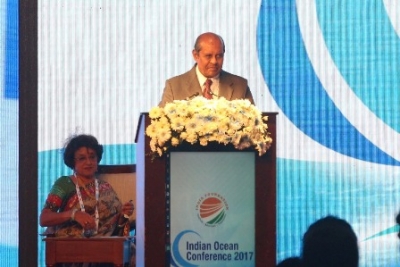 The Indian Ocean has historically been a powerful communication channel for thespread of culture, global trade and commerce. Today, the Indian Ocean’s traditional status as a major source of livelihood is more valid than ever before, as it remains an importantinternational trade highway.
The Indian Ocean has historically been a powerful communication channel for thespread of culture, global trade and commerce. Today, the Indian Ocean’s traditional status as a major source of livelihood is more valid than ever before, as it remains an importantinternational trade highway.
It is in this context that the 2nd Indian Ocean Conference assumes significance. Identifying common challenges and finding amicable solutions will help us, as a community of nations to grow, prosper and secure our future together. Sri Lanka stands ready to do whatever is necessary towards achieving peace,progress and prosperity in the Indian Ocean region.
As an island nation, Ocean Affairs is of vital significance to Sri Lanka. We have for many years participated prominently in many international and regional initiatives related to Ocean Affairs. More significantly, we were closely involved from the outset with the Third United Nations Conference on the Law of the Seaat which a new legal regime for the oceans was developed.
The situation in the world, particularly in the Indian Ocean, has undergone a major transformation since that time. The end of Cold War, and the shift towards globalization, benefitted the region’s economic thrust. However, several new challenges and threats to regional stability and security have emerged such as cross border issues, terrorism, piracy, drug trafficking, and environmental catastrophe. These challenges require thedevelopment of a common approach and commitment, by those who are present in the region.
Our economies rely on the free and secure passage of maritime trade through the region. Therefore, we have a fundamental interest in fostering peace and security and ensuring a safe maritime domain for all. An Indian Ocean, RulesBased Order that respects the rights of all states to the freedom of navigation and over-flight, and ensures unimpeded lawful maritime commerce, in line with international laws and regulations, is essential for peace and prosperity in our region and beyond. A stable and secure Ocean order will not only build confidence and predictability among its users but also assist in combating maritime crime and ensuring the safety and security of our Sea Lanes of Communication.
Sri Lanka’s National Economic Development policies have incorporated the Indian Ocean as a vital component in its Development Plan.The Blue-Green development strategy, outlined by President Sirisena, places the sustainable utilization of ocean resources atits centre. Our aim is to reap the benefits of Blue Economy by adopting environment friendly green development policies.
Distinguished Guests,
Ladies and Gentlemen,
We attach great importance to maritime connectivity. We need to start linking up maritime expertise across the board in the Indian Ocean Region. Our future depends on sharing this wealth of experience and knowledge that will lead to a collective success story.
The challenge that confronts us is to find a structureon how tosustain and promote peace, progress and prosperity in the Indian Ocean Region.
Towards this end, I believe that
-Our economic drive should be matched by a commitment to protecting our environment particularly our oceans, and to manage ocean resources in a sustainable manner in order to ensure healthier oceans and a more prosperous society.
-Our political goals need to be matched by mutual respect and a strong determination to adhere to the laws and rules based systems that govern the seas.
Let us take home a commitment to direct our energy towards a sustainable ocean economy, together with better ocean protection as well as for maintaining peace in our oceans.












